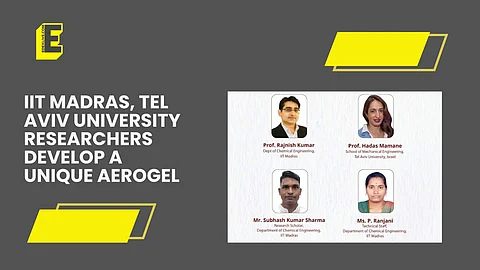

Researchers from the Indian Institute of Technology (IIT) Madras and Tel Aviv University, Israel, have developed an aerogel adsorbent that can remove trace pollutants from wastewater. According to a press release from the institute, the research offers a sustainable path for large-scale water purification.
The aerogel, which has been modified from graphene-silica removes over 76 per cent of trace pollutants (PPM level) in continuous flow conditions, IIT Madras said. The research was led by Shanti Swarup Bhatnagar Prize Awardee Prof Rajnish Kumar, research scholars Subhash Kumar Sharma and P Ranjani, from IIT Madras’ Department of Chemical Engineering, and Prof Hadas Mamane, School of Mechanical Engineering, Tel Aviv University.
"Aerogels, which are incredibly lightweight solids composed mostly of air, are excellent adsorbents (a solid substance used to remove contaminants). In addition, they offer advantages like adjustable surface chemistry, low density, and a highly porous structure. These materials, often referred to as solid air or frozen smoke, can be easily fabricated," IIT Madras said.
The researchers employed a method called supercritical fluid deposition to prepare the modified aerogel and rigorously studied their effectiveness. The findings were recently published as a paper in the prestigious journal Nature Scientific Reports.
"The Graphene-doped modified silica aerogels (GO-SA) were found to exhibit remarkable efficiency in purifying water, attracting and removing contaminants due to graphene's unique molecular structure which further enhances the available surface area of the aerogel. Under real-life conditions mimicked in their experiments, the material removed over 85 per cent of pollutants in controlled settings and more than 76 per cent in continuous flow conditions," IIT Madras explained.
Elaborating on the need for such research, Prof Rajnish said, "Indigenous techniques for wastewater purification have become essential not only to combat pollution but also to preserve water quality, protect ecosystems and mitigate health risks associated with contaminated water."
